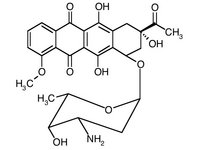Abstract
Induction therapy with all-trans-retinoic acid (ATRA), an oral vitamin A derivative, has been shown to improve the short and long-term outcome of patients with acute promyelocytic leukemia (APML). Common side effects include headache, fever, dry skin, and bone pain, and approximately 25% of treated patients experience ATRA syndrome, which includes fever, dyspnea, weight gain, pulmonary infiltrates, and pleural or pericardial effusions. Scrotal ulcerations due to ATRA are rare with 16 previously documented cases, most of whom were Asian. We report a Caucasian male with APML who developed scrotal ulceration during ATRA induction therapy and review the previously reported cases. Physicians and patients should be aware of this disturbing, but self-limited, dermatologic complication of ATRA.
**********
Introduction
Acute promyelocytic leukemia (APML, M3) is characterized by a severe hemorrhagic syndrome, hypergranular leukemic cells, and a t(15; 17) translocation. (1) All-transretinoic acid (ATRA, Vasanoid[R], Roche Laboratories) significantly improves the outcome of patients with APML by inducing differentiation of leukemic cells. (1,2) We report a case of scrotal ulceration due to ATRA and a review of similar cases.
Case Report
A 34-year-old white man presented with a 3-week history of progressively worsening epistaxis. Work-up revealed pancytopenia, coagulopathy, and a t(15; 17) translocation. The patient was diagnosed with APML and initiated on idarubicin and all-trans-retinoic acid (ATRA), 50 mg/[m.sup.2] twice a day, as induction therapy.
By day 16 of ATRA therapy, the patient developed a lowgrade fever and a slightly pruritic scrotal rash that became painful and ulcerated by the third week. On day 23, exam of the right scrotum revealed a well-defined, tender 2.3 cm necrotic ulcer with a central black eschar and surrounding superficial scale and erythema (Figure 1). Review of systems was negative and the rest of the physical exam was unremarkable. Blood cultures were negative as were viral, bacterial, and fungal cultures from the scrotum. ATRA was continued and the ulceration was treated with 1% hydrocortisone ointment in the morning and mupirocin ointment in the evening. One week later, fever, pain, and erythema subsided, but the ulcer was unchanged. ATRA was continued without additional complications and the ulcer healed within 2 weeks.
[FIGURE 1 OMITTED]
Discussion
ATRA is generally well-tolerated, and 90% of treated patients achieve complete remission of APML. (3) Reversible adverse effects reported include headaches, fevers, xerosis and mucosal dryness, liver abnormalities, muscle and bone pain, hyperlipidemia, and pseudotumor cerebri. One reported complication is ATRA syndrome, affecting approximately 25% of treated patients, and characterized by fever, dyspnea, weight gain, radiographic pulmonary infiltrates, and pleural or pericardial effusions. Rarely, scrotal involvement such as ulceration, (3-8) exfoliative dermatitis, (8) or Fournier's gangrene (4) has been reported.
Based on previously reported cases, ATRA-induced genital ulceration occurs between the first and fourth week of initiating therapy. Except in one case of progression, the lesions heal within 2 months, an outcome that appears to be unrelated to treatment or whether ATRA is discontinued. (3-5) One reported patient had a relapse of APML after 2 years and redeveloped scrotal lesions upon re-administration of ATRA, suggesting a strong association between the lesions and the medication. (7) Our patient developed scrotal ulceration 3 weeks after therapy and had relief with topical medications despite continuing ATRA therapy.
The pathogenesis of scrotal ulceration remains unclear. Neutrophilic superoxide and cytokine release due to ATRA are hypothesized to cause tissue damage. (5,7) Biopsies of ulcers have not been reported, but based on negative cultures, infectious agents seem to be unlikely causes. (5) Some patients had fever and/or other characteristics of ATRA syndrome concurrent with the ulceration, suggesting it may be part of an ATRA syndrome spectrum.
Meticulous wound care, topical steroids, and monitoring for secondary infection may be the most suitable management. Physicians and patients should be aware of this disturbing, but self-limited, dermatologic complication of ATRA.
References
1. Mandelli F, Avvisati G, Lo CF. Advances in the understanding and management of acute promyelocytic leukemia. Rev Clin Exp Hematol. 2002;6:60-71.
2. Huang ME, Ye YC, Chen SR, et al. Use of all-trans retinoic acid in the treatment of acute promyelocytic leukemia. Blood. 1988;72:567-72.
3. Esser AC, Nossa R, Shoji T, Sapadin AN. All-transretinoic acid-induced scrotal ulcerations in a patient with acute promyelocytic leukemia. J Am Acad Dermatol. 2000;43:316-7.
4. Fukuno K, Tsurumi H, Goto H, Oyama M, Tanabashi S, Moriwaki H. Genital ulcers during treatment with ALL-trans retinoic acid for acute promyelocytic leukemia. Leuk Lymphoma. 2003;44:2009-13.
5. Charles KS, Kanaa M, Winfield DA, Reilly JT. Scrotal ulceration during all-trans retinoic (ATRA) therapy for acute promyelocytic leukaemia. Clin Lab Haematol. 2000;22:171-4.
6. Pavithran K, Arjun R, Aruna R, Thomas M. Scrotal ulceration during induction therapy of acute promyelocytic leukemia with ATRA. Am J Hematol. 2004;75:260-1.
7. Mori A, Tamura S, Katsuno T, et al. Scrotal ulcer occurring in patients with acute promyelocytic leukemia during treatment with all-trans retinoic acid. Oncol Rep. 1999;6:55-8.
8. Sun GL, Ouyang RR, Chen SJ, et al. Treatment of acute promyelocytic leukemia with all-trans retinoic acid. A five-year experience. Chin Med J (Engl). 1993;106:743-8.
Soheil Simzar BS, Adam M. Rotunda MD, Noah Craft MD PhD
Division of Dermatology, Department of Medicine, David Geffen School of Medicine at University of CA, Los Angeles
Address for Correspondence
Noah Craft, MD
Division of Dermatology, Department of Medicine, David Geffen School of Medicine
University of California at Los Angeles (UCLA)
Suite 450
Box 956957
Los Angeles, CA 90095-6957
Tel: 310-206-6371
Fax: 310-794-7005
e-mail: ncraft@ucla.edu
COPYRIGHT 2005 Journal of Drugs in Dermatology, Inc.
COPYRIGHT 2005 Gale Group



